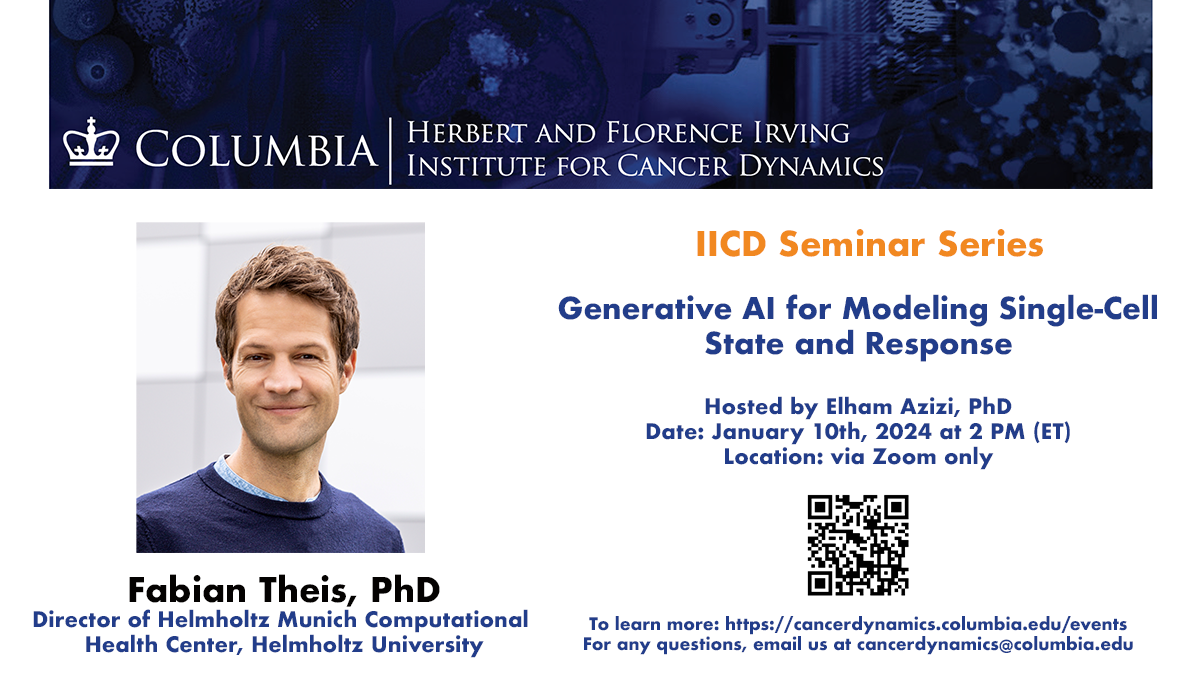The Herbert and Florence Irving Institute for Cancer Dynamics will continue its seminar series on the topic of mathematical sciences underpinning cancer research during the 2022-2023 academic year. The monthly seminars take place on the second Wednesday of the month, 2:00-3:00 PM EST. The presentations are open to the Columbia community (in person and online) and to researchers outside Columbia (via Zoom).
On Wednesday, January 10th (2:00 PM ET), IICD welcomes Fabian Theis, PhD, Director of the Computational Health Center, Director of the Institute for Computational Biology, Helmholtz Munich, Technical University of Munich. Seminar hosted by Elham Azizi, PhD. The seminar will take place virtually. If you wish to attend the seminar, please register using the following link: https://columbiauniversity.zoom.us/meeting/register/tJUtdOisqTMpHdddW9wtLHsLyAbe7wX3daTW
Title: Generative AI for Modeling Single-Cell State and Response
Abstract: Advances in single cell genomics nowadays allow the large scale construction of organ atlases. These can be used to study perturbations such as signaling, drugs or diseases, with large-scale access to state changes on the multi-omic and spatial level. This provides an ideal application area for machine learning methods to understand cellular response. With generative AI revolutionizing many fields of science by allowing researchers to explore uncharted territories, generate novel hypotheses, and simulate complex phenomena, we ask how it has been enabling modeling single cell variation, potentially towards a single cell foundation model.
After reviewing deep generative representation learning approaches to identify the gene expression manifold, I will shortly outline some applications on cell atlas building. Then I will discuss interpretable modeling of perturbations on this manifold, in particular effect of drug responses as well as multiscale readouts such as disease state across patients, and how to learn organism-wide cell type predictors. I will finish with extensions towards temporal and spatial observations. (http://comp.bio)
Bio: Fabian Theis studied Mathematics and Physics and has PhDs in Physics and Computer Science. After different research stays abroad he was a Bernstein fellow leading a junior research group at the Bernstein Center for Computational Neuroscience, located at the Max Planck Institute for Dynamics and Self-Organisation at Göttingen. In 2007 he became junior group leader at the Helmholtz Center Munich and associate professor at the Technical University of Munich.
Fabian Theis is the Director of Helmholtz Munich Computational Health Center and Scientific Director of HelmholtzAI, which was launched in 2019. He is a Full Professor at the Technical University of Munich, holding the chair ‘Mathematical Modelling of Biological Systems,’ Associate Faculty at the Wellcome Trust Sanger Institute, Hinxton, UK.
Professor Fabian Theis received one of the prestigious Advanced Grants from the European Research Council (ERC) for his project "DeepCell." Additionally, Fabian Theis was accepted for membership in the European Molecular Biology Organization (EMBO) in July 2022 and was appointed to the Board of Directors of Human Cell Atlas, Inc. and to the Human Cell Atlas Organising Committee. Furthermore, Fabian Theis has just been awarded the prestigious Gottfried Wilhelm Leibniz Prize 2023 by the German Science Foundation (DFG).

